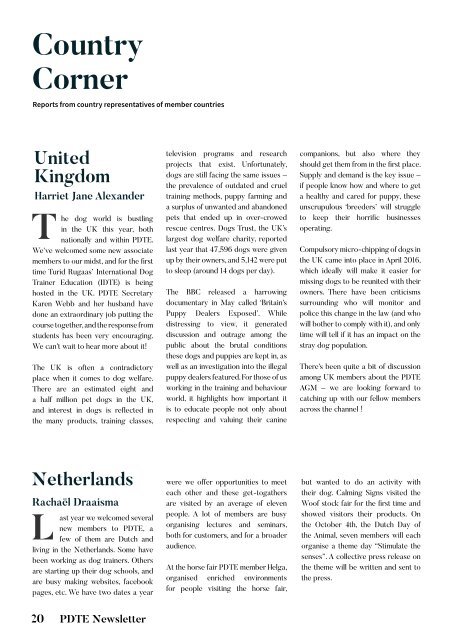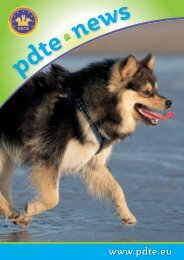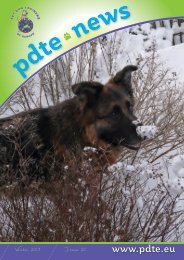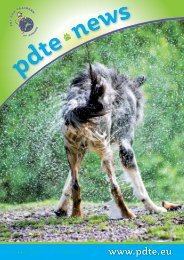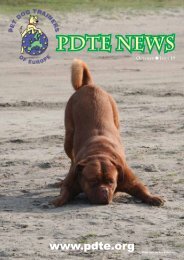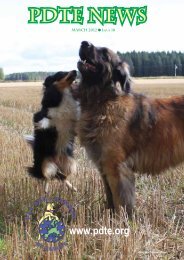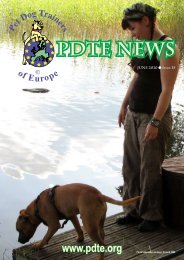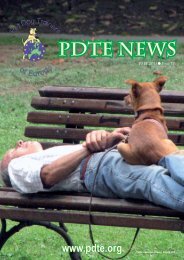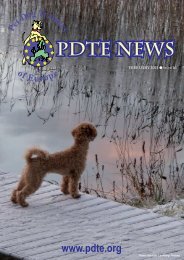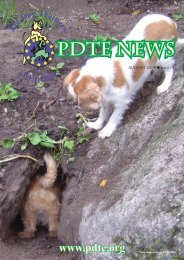PDTE 2016 July Newsletter
Create successful ePaper yourself
Turn your PDF publications into a flip-book with our unique Google optimized e-Paper software.
Country<br />
Corner<br />
Reports from country representatives of member countries<br />
United<br />
Kingdom<br />
Harriet Jane Alexander<br />
T<br />
he dog world is bustling<br />
in the UK this year, both<br />
nationally and within <strong>PDTE</strong>.<br />
We’ve welcomed some new associate<br />
members to our midst, and for the first<br />
time Turid Rugaas’ International Dog<br />
Trainer Education (IDTE) is being<br />
hosted in the UK. <strong>PDTE</strong> Secretary<br />
Karen Webb and her husband have<br />
done an extraordinary job putting the<br />
course together, and the response from<br />
students has been very encouraging.<br />
We can’t wait to hear more about it!<br />
The UK is often a contradictory<br />
place when it comes to dog welfare.<br />
There are an estimated eight and<br />
a half million pet dogs in the UK,<br />
and interest in dogs is reflected in<br />
the many products, training classes,<br />
Netherlands<br />
Rachaël Draaisma<br />
Last year we welcomed several<br />
new members to <strong>PDTE</strong>, a<br />
few of them are Dutch and<br />
living in the Netherlands. Some have<br />
been working as dog trainers. Others<br />
are starting up their dog schools, and<br />
are busy making websites, facebook<br />
pages, etc. We have two dates a year<br />
television programs and research<br />
projects that exist. Unfortunately,<br />
dogs are still facing the same issues –<br />
the prevalence of outdated and cruel<br />
training methods, puppy farming and<br />
a surplus of unwanted and abandoned<br />
pets that ended up in over-crowed<br />
rescue centres. Dogs Trust, the UK’s<br />
largest dog welfare charity, reported<br />
last year that 47,596 dogs were given<br />
up by their owners, and 5,142 were put<br />
to sleep (around 14 dogs per day).<br />
The BBC released a harrowing<br />
documentary in May called ‘Britain’s<br />
Puppy Dealers Exposed’. While<br />
distressing to view, it generated<br />
discussion and outrage among the<br />
public about the brutal conditions<br />
these dogs and puppies are kept in, as<br />
well as an investigation into the illegal<br />
puppy dealers featured. For those of us<br />
working in the training and behaviour<br />
world, it highlights how important it<br />
is to educate people not only about<br />
respecting and valuing their canine<br />
were we offer opportunities to meet<br />
each other and these get-togathers<br />
are visited by an average of eleven<br />
people. A lot of members are busy<br />
organising lectures and seminars,<br />
both for customers, and for a broader<br />
audience.<br />
At the horse fair <strong>PDTE</strong> member Helga,<br />
organised enriched environments<br />
for people visiting the horse fair,<br />
companions, but also where they<br />
should get them from in the first place.<br />
Supply and demand is the key issue –<br />
if people know how and where to get<br />
a healthy and cared for puppy, these<br />
unscrupulous ‘breeders’ will struggle<br />
to keep their horrific businesses<br />
operating.<br />
Compulsory micro-chipping of dogs in<br />
the UK came into place in April <strong>2016</strong>,<br />
which ideally will make it easier for<br />
missing dogs to be reunited with their<br />
owners. There have been criticisms<br />
surrounding who will monitor and<br />
police this change in the law (and who<br />
will bother to comply with it), and only<br />
time will tell if it has an impact on the<br />
stray dog population.<br />
There’s been quite a bit of discussion<br />
among UK members about the <strong>PDTE</strong><br />
AGM – we are looking forward to<br />
catching up with our fellow members<br />
across the channel !<br />
but wanted to do an activity with<br />
their dog. Calming Signs visited the<br />
Woof stock fair for the first time and<br />
showed visitors their products. On<br />
the October 4th, the Dutch Day of<br />
the Animal, seven members will each<br />
organise a theme day “Stimulate the<br />
senses”. A collective press release on<br />
the theme will be written and sent to<br />
the press.<br />
Some other dog related news from the<br />
Netherlands. The dog is still a very<br />
beloved family companion. Number<br />
of dogs in the Netherlands is being<br />
considered steady by the government.<br />
The estimation is that every one out of<br />
five families in the Netherlands owns a<br />
dog. Eighty percent of these families<br />
have children. This is about one and a<br />
half million dogs in this country. Mind<br />
you these are the registered dogs. The<br />
number could well be higher. Great<br />
news is the decision of the Dutch<br />
government to ban the shock devices<br />
sold at stores. However the huge<br />
disappointment is the fact that the<br />
government does make an exception<br />
Belgium<br />
Marina Gates Flemming<br />
Belgium is a sovereign state<br />
in Western Europe. It is a<br />
founding member of the<br />
European Union and hosts several<br />
of the EU’s official seats and as well<br />
as the headquarters of many major<br />
international organizations such as<br />
NATO.<br />
Belgium covers an area of just<br />
over 30,000 square km and has<br />
a population of about 11.5 million<br />
people. The capital, Brussels, is also<br />
the capital of the EU and of Flanders.<br />
Belgium is home to 3 linguistic<br />
groups: the Dutch-speaking, Flemish<br />
community, which constitutes<br />
about 59% of the population, the<br />
French-speaking, mostly Walloon<br />
population, which comprises 41% of<br />
the population and a small group of<br />
German-speakers who are officially<br />
recognized.<br />
for dog specialists, who use these<br />
devises to prevent danger for others.<br />
A growing number of dog lovers<br />
question the use of vaccinations and<br />
are requesting information regarding<br />
tittering their dog. More places are<br />
offering titter tests for dogs.<br />
The Kennel club of the Netherlands<br />
sent out news that the faculty of<br />
Dierengeneeskunde of the University<br />
of Utrecht has developed DNA tests<br />
that enable owners of the Dutch<br />
breeds: the Kooiker and the Friese<br />
Stabij, to test if their dog is a bearer<br />
of a divergent gene. In the Friese<br />
Belgium is a federal constitutional<br />
monarchy with a parliamentary system<br />
of governance and the territory is<br />
divided into three Regions: Flanders,<br />
(the Flemish Region), Wallonia (the<br />
French speaking Region) and the<br />
Brussels Capital Region (where you<br />
will hear many a language spoken).<br />
Belgium has compulsory voting and<br />
thus maintains one of the highest rates<br />
of voter turnout in the world.<br />
Based on the four language areas<br />
defined in 1962–63 (the Dutch,<br />
bilingual, French and German language<br />
areas), consecutive revisions of the<br />
country’s constitution established a<br />
unique form of a federal state with<br />
segregated political power into three<br />
levels:<br />
1. The Federal government based in<br />
Brussels.<br />
2. The three language communities<br />
3. The three regions<br />
The Federal Government authority<br />
includes justice, defense, federal<br />
police, social security, nuclear energy,<br />
Stabij the divergent gene causes<br />
an error in a protein that normally<br />
ensures the reabsorption of a neuro<br />
transmitter after a neuron is activated.<br />
The defective protein reabsorption<br />
leads to continuous stimulus. This<br />
results in compulsive behaviour in<br />
pups like walking in circles. Pups<br />
that are diagnosed with this disease<br />
are being euthanized. The DNA test<br />
is developed to be used by breeders<br />
before they start breeding. In the<br />
Kookier dog the defect gene that can<br />
be tested upon is causing paralysing<br />
of the hind legs. A cure has not been<br />
found. Breeders can take the DNA<br />
test as a precaution.<br />
monetary policy and public debt,<br />
and other aspects of public finances.<br />
It controls substantial parts of public<br />
health, home affairs and foreign<br />
affairs.<br />
Regions have authority in fields that<br />
can be broadly associated with their<br />
territory. These include economy,<br />
employment, agriculture, water<br />
policy, housing, public works, energy,<br />
transport, the environment, town and<br />
country planning and nature.<br />
Since mid 2014, Welfare for animals<br />
has been devolved to the 3 regions.<br />
They have all inherited the Animal<br />
Welfare Act which was written in<br />
1986. Each region will be looking to<br />
update this and have each appointed<br />
an Animal Welfare Minister<br />
(Flanders: Ben Weyts; Wallonia:<br />
Carlo Di Antonio and Brussels<br />
Capital: Bianca Debaets); this being<br />
just one of their responsibilities.<br />
I propose to comment on the<br />
progress made by the respective<br />
animal welfare ministers in the next<br />
newsletter.<br />
20<br />
<strong>PDTE</strong> <strong>Newsletter</strong> <strong>PDTE</strong> <strong>Newsletter</strong> 21


